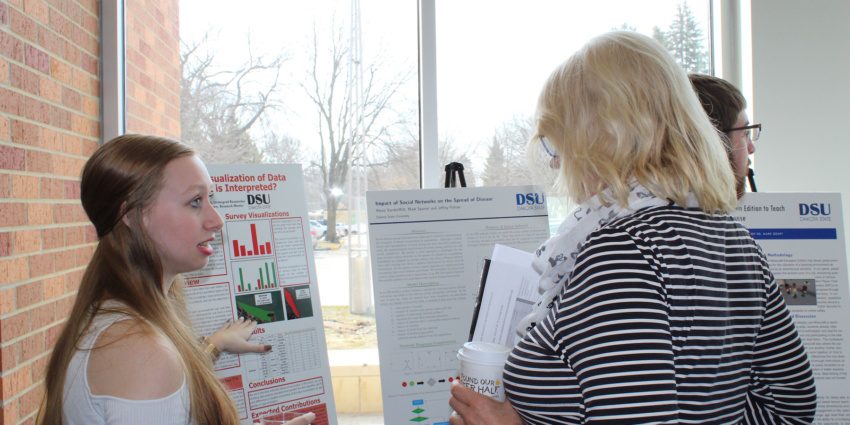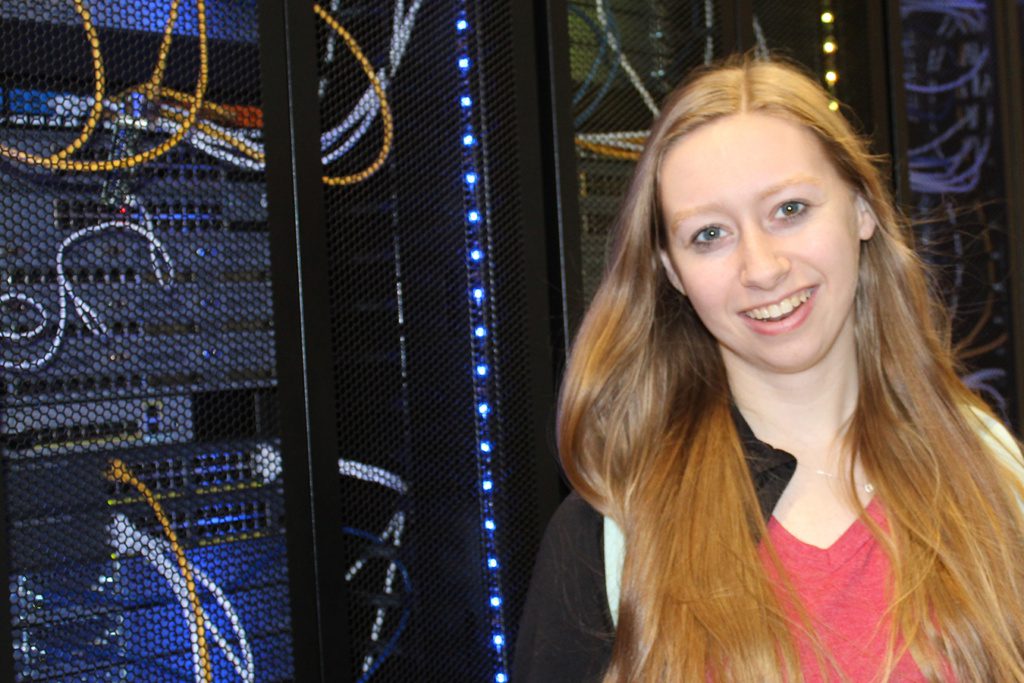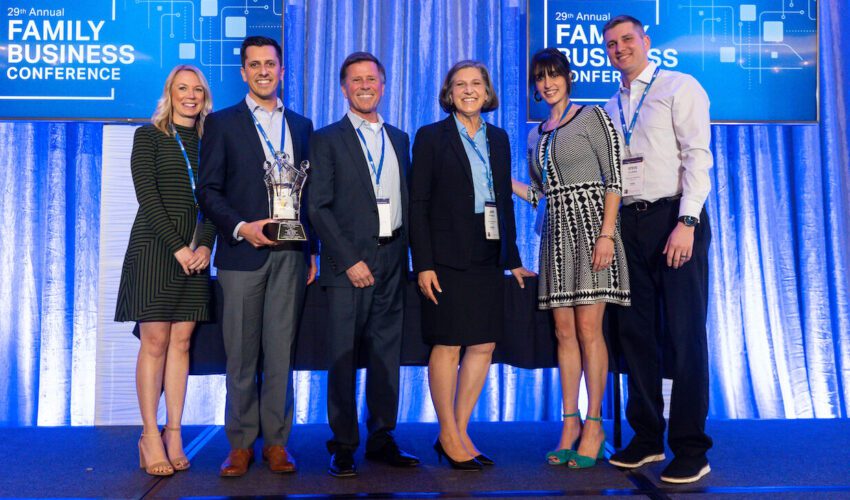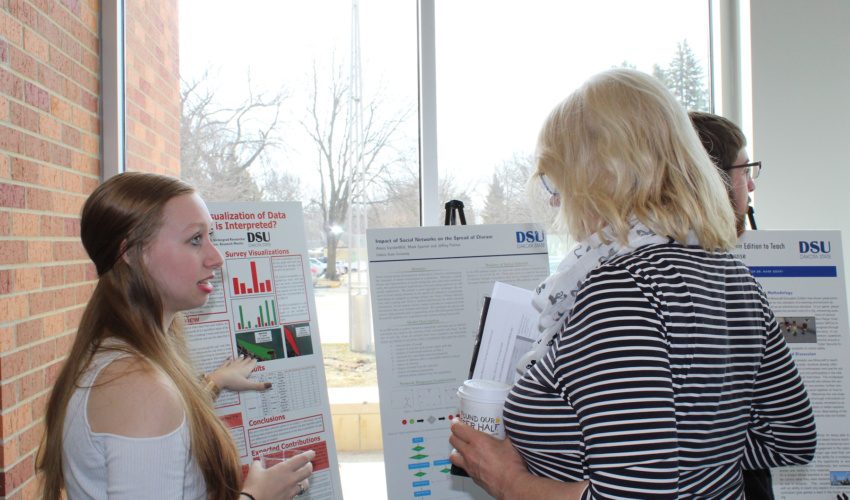Next generation of innovative scientists gets head start at DSU
July 15, 2019
This paid piece is sponsored by Dakota State University
In 2012, Dr. Michael Gaylor traded in life on the East Coast for the prairie and plains of South Dakota. His passion for science and research brought him to the city of Madison – home to Dakota State University.
Gaylor, associate professor of chemistry, was hired, in part, to build a recognized culture of undergraduate scientific research and to produce the next generation of innovative scientists. He believes that engaging students in independent research is the ultimate way to teach and inspire students toward lifelong discovery and learning.
“I teach my students how to conduct experiments that reveal secrets about some natural phenomena that intrigues them. They learn the thrill of discovering something about the universe that no one else on the planet knows. Once they experience this, they’re hooked,” he said.
It’s just one example of Dakota State’s increasingly growing undergraduate research program and commitment to give DSU students more opportunity to shine.
“The best way for students to get involved in research is through faculty. When a faculty member is excited about it and mentions it in their classroom, it gets students excited,” said Dr. Pam Rowland, assistant professor of computer science and cybersecurity and undergraduate research coordinator.
Inspired by both Rowland and Gaylor, DSU senior Alexis VanderWilt began conducting research during her freshman year. VanderWilt was initially recruited by Gaylor to conduct molecular modeling simulations of chemical compounds thought to be important for the emergence of life on the ancient Earth and other worlds.
VanderWilt’s early research in Gaylor’s lab led to an unprecedented invitation for her and her student collaborators to present their research at the prestigious Origins of Life Gordon Research Conference, a gathering of the world’s leading experts in their fields that undergraduates are not usually permitted to attend.
For VanderWilt , it was a profoundly transformative experience. For DSU, it was a wonderful opportunity to showcase the achievements of its undergraduates in a scholarly forum in which the DSU name and brand was not previously known.
“Dr. Michael Gaylor and Dr. Pam Rowland showed me the world of undergraduate research,” VanderWilt said. “I am so grateful for the amazing faculty and staff that are willing to use their time to help me learn and discover the amazing research world.”
Since then, VanderWilt has conducted computer and cybersecurity research projects. Specifically, she has studied the impact of a person’s socialization on their ability to spread an epidemic, as well as the impact of data visualization and the effect of its interpretation.
With the help, advice and guidance of faculty mentors, students like VanderWilt can conduct multidisciplinary research collaborations in their own ways, gaining valuable skills in communication, creativity, advocation, influence and critical engagement.
“Students attain this ability to critically engage with new materials and transfer what they’ve learned to other domains. It’s something many employers desire in prospective employees,” said Dr. Pete Hoesing, sponsored programs director.
By engaging in novel research, students learn how to solve challenging real-world problems as part of a collaborative team,” Gaylor added.
“They learn to think critically and skeptically about every piece of data they collect and to consider the importance of their discoveries in the context of what is already known by science,” he said.
“They also learn to innovate and improvise with minimal resources and to present complex technical information to diverse audiences orally and in writing. These are the crucial skill sets that excite the best employers to hire them and the best graduate and professional programs to recruit them. And, best of all, my research students make permanent contributions to human knowledge in the form of scholarly publications that live on forever.”
In addition to their building their repertoire, participants in DSU’s undergraduate research program have:
- Disciplinary learning beyond traditional classroom settings.
- Greater gains in learning.
- Greater participation in campus intellectual activities.
- Increased connection to and retention within the major.
- Increased employment in major-related fields.
- Integration into the culture and profession of discipline.
- Stronger enrollment in graduate education.
Students also obtain valuable technology skills by using state-of-the-art-labs and software systems. VanderWilt, who majors in computer science and mathematics for information systems, has utilized computer software such as SAGE math, Tableau and Publisher to help her analyze and design research experiments.
Though technology plays a huge role in research, experiments and initiatives also can be carried out in the form of literature reviews, observations, conversations and experiments.
“The process is different, based on the research project. You have to form a hypothesis, collect data, analyze that data and determine a conclusion,” Rowland said.
The experience can be customized for the student’s level and be influenced by the faculty mentor, Hoesing said.
“Some faculty have students research questions that they themselves have been studying for years; others want students to develop their own distinctive voices and research initiatives of their own,” he said.
Students can share their distinctive voices by presenting their posters at the annual DSU Research Symposium. The symposium takes place every spring and includes poster and presentation sessions by students and faculty from all academic disciplines.
VanderWilt, who placed first at the DSU Research Symposium, also is set to present at conferences such as the Heidelberg Laureate Forum in September in Heidelberg, Germany, and the Grace Hopper Celebration in October in Orlando, Fla.
“I’ve started to notice all the questions in the world that have yet to be answered. I am so grateful for the amazing faculty and staff that are willing to use their time to help me learn and discover the amazing world of research,” VanderWilt said.
Dakota State University is a member of the Council on Undergraduate Research, which focuses on providing superior and collaborative research as well as academic and creative activities for students and faculty.
Here are additional examples of undergraduate research projects from Dakota State University:
- Impact of Social Networks on the Spread of Disease
- Student researcher: Alexis VanderWilt
- Faculty mentors: Mark Spanier and Jeffrey Palmer
- Profiling Volatile Constituents of Homemade Preserved Foods Prepared in Early 1950s South Dakota (USA) Using Solid-Phase Microextraction (SPME) with Gas Chromatography – Mass Spectrometry (GC-MS) Determination
- Student researchers: Lucas J. Leinen, Vaille A. Swenson and Hope L. Juntunen
- Faculty mentor: Michael Gaylor
- Collaborating faculty: Scott E. McKay, Ph.D.; Samantha M. O’Hanlon, Ph.D.; and Patrick Videau, Ph.D.
- Impact of Backwards Design on 4th Grade Mathematics Students’ Understanding of Adding and Subtraction of Whole Numbers
- Student researcher: Andrew Fiegen
- Faculty mentor: Kindra Schneider
- Characterizing Volatile Emissions from Sewage Sludge Residues Land-Applied to Forested and Agricultural Lands of the U.S. Pacific Northwest
- Student researchers: Kaytlyn N. Schaefer, Lucas J. Leinen, Vaille A. Swenson, Bailey A. Moody and Hope L. Juntunen
- Faculty mentor: Michael Gaylor
- Collaborating faculty: Scott E. McKay, Ph.D.; Silvia Beurmann, Ph.D; Samantha M. O’Hanlon, Ph.D.; Richard C. Honour, Ph.D.; Robert C. Hale, Ph.D.; and Patrick Videau, Ph.D.









